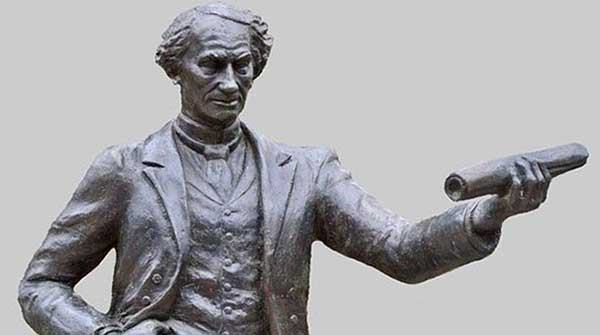The complex legacy of Canada’s founding father, Sir John A Macdonald
 It was only a few short years ago that Sir John A Macdonald was rightly honoured as the first among equals as a Father of Confederation.
It was only a few short years ago that Sir John A Macdonald was rightly honoured as the first among equals as a Father of Confederation.
There was no one more responsible for creating the Canada that we know today. The list of his achievements both before and after Confederation is unparalleled. He wrote most of the Constitution and established a nation from sea to sea to sea with the purchase of all of northern and western Canada (the Hudson’s Bay Company territory) from Great Britain and with the construction of the Canadian Pacific Railway.
As biographer Richard Gywn succinctly put it, “No Macdonald, no Canada.”
And yet, in recent years, in a nation that has forgotten (or has never been taught) its history, his statues have been toppled and his name effaced from public buildings.
 |
| Related Stories |
| John A. Macdonald’s mistake
|
| The man who saved the Plains Indians
|
| Sir John A Macdonald and the fog of cancel culture
|
The most recent outrage comes from Ottawa, where Macdonald, ever the political pragmatist, worked his magic and built a nation: the removal of his name from the Ottawa river parkway courtesy of the National Capital Commission. The supposed rationale? His treatment of indigenous Canadians and, in particular, his involvement with Canada’s Indigenous residential school system.
However, contrary to much recent press coverage, Macdonald was not responsible for the residential school system and he was a vigorous advocate for indigenous Canadians.
Indigenous residential and day schools existed long before Confederation and were privately funded and voluntarily attended. The various treaties his government negotiated in the 1870s with indigenous Canadians required the government to build schools when requested by the band leadership, resulting in the construction of about 185 day schools and 20 residential schools.
However, it was the policy of Macdonald’s government that all school attendance for indigenous children, unlike the policy applied to other Canadian children, be voluntary and not compulsory. This policy continued long after the prime minister’s death. Even in the 1950s, most indigenous children, whether at a day school or a residential school, attended for only one year.
And contrary to the anti-Macdonald propaganda, he was also a vigorous defender and supporter of Canada’s indigenous peoples. In Parliament, he advocated for their fair treatment and backed his rhetoric with action and policies. And his impassioned defence of his policies (his speeches were often reprinted in the newspapers of the day) persuaded the Canadian people to support his vision.
Yet what have we heard recently of Macdonald’s many initiatives in support of native Canadians? Initiatives that saved tens of thousands of lives? Those initiatives included:
Smallpox vaccination: Through the 1870s and 1880s, Macdonald’s government ran a national program to vaccinate every indigenous Canadian (including those in the former Hudson Bay Territory) against the scourge of smallpox. The vaccination program was a success, and the threat of smallpox, which in some pre-Confederation years had killed more than 10,000 native Canadians, was ended.
Famine relief for Plains natives: When the much-predicted (for more than 30 years) collapse of the buffalo population finally arrived in the late 1870s, relief programs for Canadians at the time were largely privately funded. However, Macdonald immediately implemented a massive famine relief program run by the federal government. A year later, more than 30,000 indigenous Canadians were being supported by the program, which ran for another five years, was a great success and saved many native lives.
Negotiating treaty rights before allowing settlement in the Hudson Bay territory: The United States allowed settlement of the West before negotiating treaties with the indigenous inhabitants. The result was a series of “Indian Wars” fought over 100 years that resulted in more than 60,000 native deaths and 20,000 settler deaths. Macdonald was determined to avoid a similar outcome in Canada by negotiating land settlement treaties with native Canadians before settlement began. He succeeded: there were no Indian Wars in Canada, and many indigenous lives were saved.
The creation of the North-West Mounted Police (NWMP): An essential piece of Macdonald’s plan to avoid conflict in the new territory was to create a police force to establish a Canadian government presence, deter formal or informal violent incursions from the U.S. and to protect the respective rights of the indigenous and settlers when settlement began. As Macdonald stated in Parliament, “the duty of the police is not only to protect the white man against the Indian but the Indian against the white man”). The NWMP (now the RCMP), relying more on moral suasion than firepower, was a great success.
Canada is a young country. We don’t have many towering figures to look to, political, military or otherwise. A fair-minded review of Macdonald’s contributions to our country, as both a Father of Confederation and as a strong advocate for its indigenous peoples, suggests that he is one that we need to keep.
Greg Piasetzki is a Toronto lawyer, a citizen of the Métis Nation of Ontario, a Senior Fellow with the Aristotle Foundation for Public Policy, and a chapter author of The 1867 Project: Why Canada Should Be Cherished – Not Cancelled.
For interview requests, click here.
The opinions expressed by our columnists and contributors are theirs alone and do not inherently or expressly reflect the views of our publication.
© Troy Media
Troy Media is an editorial content provider to media outlets and its own hosted community news outlets across Canada.

